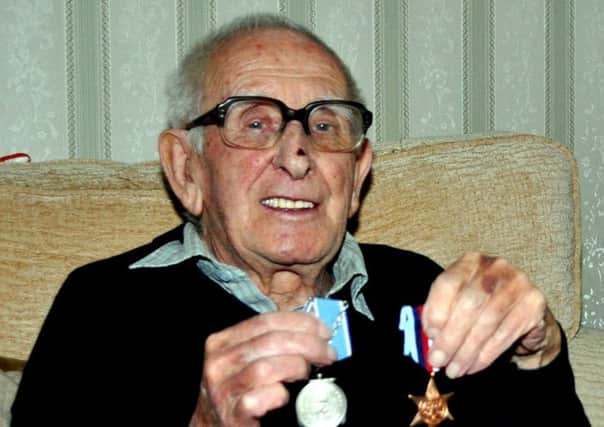Obituary: Arthur McWatt, Second World War Arctic Convoy survivor, Ushakov Medal and Arctic Star holder


Second World War veteran Arthur McWatt was surprised when the Consul General of the Russian Federation in Edinburgh turned up at his 90th birthday party in Cardross Golf Club, Dunbartonshire.
Consul General Andrey Pritsepov presented Arthur, who has sadly died at home in Geils Avenue, Dumbarton, aged 94, with the Ushakov Medal for Bravery while taking part in the Arctic Convoys near the end of the Second World War.
Advertisement
Hide AdAdvertisement
Hide AdThe Ushakov medal was awarded to seamen who displayed courage in the course of defending Russia or its interests. Prime Minister Winston Churchill said the Arctic convoys’ missions through the hazardous and freezing North Sea in winter were “the worst journey on earth”.
Under constant threat of attack by German U-boats and aircraft, the convoys also had to deal with severe cold, storms, and ice floes.
By May 1945, the Arctic route had claimed 104 merchant and 16 military vessels and thousands of Allied seamen lost their lives
Arthur was the first person in Scotland to receive the medal for serving on the destroyer HMS Walker, which was built at Denny’s Leven shipyard in his home town of Dumbarton, where his father had been an employee.
HMS Walker was part of the fleet with the hazardous task of escorting merchant ships between the UK and the Soviet Union.
Just 18 at the time, Able Seaman McWatt said his ship was “leaking like a sieve” when it sailed through mountainous seas alongside the destroyers HMS Beagle and HMS Boadicea, and four Flower-class corvettes.
Although the convoy, carrying vital arms and food supplies to northern Russia, endured German air and submarine attacks during its passage, it suffered no losses among its ships and arrived safely at the Kola Inlet on 28 February, 1944.
Two months later, HMS Walker joined the same vessels as close escort for the returning convoy, carrying from Russia reciprocal supplies of timber, coal, fur and magnesium, when it was attacked by German submarines.
Advertisement
Hide AdAdvertisement
Hide AdHowever, it arrived safely at Loch Ewe in Scotland, on 10 March. The convoy escort ships were constantly threatened as they went about their business, which included escorting the merchant ship Nea Hellas on a voyage to collect ships and personnel from various Soviet Arctic ports.
At one point, HMS Walker took on board 13 United States Navy enlisted men and brought them back to the UK.
Again they experienced freezing conditions and two days of terrifying German submarine torpedo attacks.
The UK Foreign Office initially did not allow Russia to honour veterans like Arthur as it broke the rules on foreign medals.
When the medal was first presented to him at his home in Dumbarton, surrounded by birthday cards and flowers to mark his 90th birthday on 4 November, 2014, Arthur said: “I certainly didn’t feel like a hero. I was just a teenager at the time, too young even to qualify for a tot of rum.
“I just did what I had to do and that was that. The conditions were atrocious and our ship, which was built here in Dumbarton, leaked like a sieve. We were up to our knees and sometimes up to our waists in freezing water.”
He said the medal presentation was a great surprise to him – “I knew nothing about it. I didn’t even know it was going to happen.”
Arthur was born in Mandalay, Burma, where his father worked as part of a team from Denny’s shipyard building the Irrawaddy fleet.
Advertisement
Hide AdAdvertisement
Hide AdThe Irrawaddy Flotilla Company (IFC), which operated in Burma from 1865 until the late 1940s, was once the finest river fleet in the world. A century ago it comprised over 500 vessels of which about 180 were powered paddle steamers and the remainder barges and “flats” for carrying cargo.
There was always a strong Scottish connection with Burma. Until independence in 1948 most of the 200 British staff in Burma were Scots, almost all the powered paddle steamers were built on the Clyde.
Arthur returned with his parents to Dumbarton as a teenager and went to Dumbarton Academy for two years before taking up a post at the old Employment Exchange in College Street. It was there that he signed up for service in the Royal Navy.
He married farmer’s daughter, the late Margaret McKinstry Hebenton, of Ardardan Farm, in Cardross Parish Church in July, 1952, and worked as a civil servant until his retirement.
He is survived by his children, Brian, David and Marie and grandchildren, Joanne, Martin, Tina, Kevan, David, Scott, Paul, Catherine, Andrew and Adam and 11 great grandchildren.
Arthur was well known throughout Dunbartonshire and beyond as an enthusiastic golfer and had been a member at Cardross Golf Club since 1948. He was a respected past captain and vice president of the club.
Civic Dumbarton also turned up at the golf club, which was festooned with Russian Federation flags, for the medal presentation. MSP Jackie Baillie MSP and the then Deputy Provost John Miller congratulated Arthur on his achievements.
In addition to the Ushakov medal, Arthur was also presented with a splendid pocket flask emblazoned with the Russian eagle.
Advertisement
Hide AdAdvertisement
Hide AdHe was also the proud possessor of the Arctic Star which the British government created in 2012 following a long campaign for the convoy veterans to be recognised.
Arthur McWatt’s funeral service, which took place at Cardross Crematorium, was conducted by the Rev Ian Johnson, of Riverside Parish, Church, Dumbarton.
BILL HEANEY